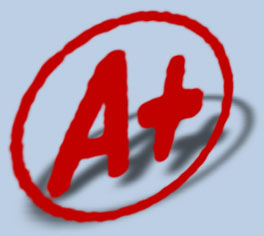 I asked students to write about their grades, and their responses reflect student thinking about grades, school, and learning.
I asked students to write about their grades, and their responses reflect student thinking about grades, school, and learning.
Students have a hard time getting used to my policy on grading and reteaching. When I announced it at the beginning of school, one student was vocally opposed to students who pass a test using up tutoring resources to improve a grade that was already passing.
In mid-September, I asked my students to write about their grades. A prompt on their warm-up assignment asked, “What grade do you deserve on your progress report Monday?”
Here are some of the interesting responses:
- “I think probably between a 90 – 100” This was a pretty typical response. Saying, “I deserve an A.”
- “100?” I appreciate the uncertainty in this response. This student isn’t sure if they deserve a perfect score. Would you know it if you were perfect?
- “99.9” I love the precision here. Reminds me of teachers who are certain that a student earned a 69 but not a 70.
- “a 95 because I turn in work on time and 5 points off because I talk during class.” Wow. This student based their grade on two criteria: promptness and classroom behavior. What experiences did this student have in school to create this notion?
- “100 or maybe a 86” Well, if I’m not perfect, then I am a B+.
- “80% because I didn’t do well on the test” Ah, finally someone who almost references learning. Hopefully this 8th grader will eventually be able to distinguish between a test grade and learning, but this is a start. More importantly, I want this student to understand more about their learning that “the test.” What was on the test? My goal is for this student to be able to articulate, “I need more help using a proportion to solve a problem.”
- “A 90, because I want to remake my test and get a 100.” Another step in the right direction. The emphasis is still on the retest, not the learning.
Of course I set up my students asking about what grade they deserve. I used these responses to draw the distinction between performance on a test and learning. Those discussions helped many of them realize that grades in my class are dynamic and I strive to use them to indicate a student’s current level of understanding. The comments from the students also helped me to understand where I needed to improve (helping students understand what content they know and don’t know, for example) and what misconceptions to target.
